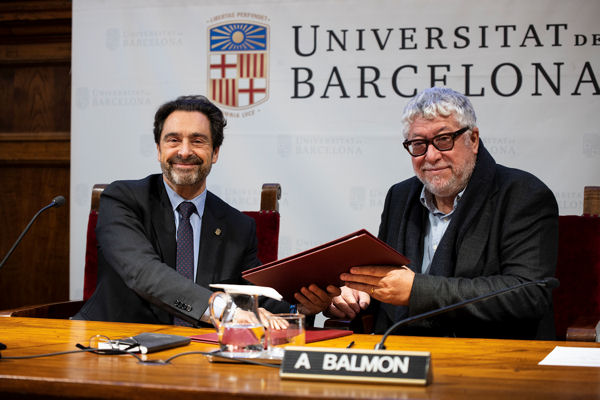The UB and Cornellà create a Chair to promote the study of the gender perspective and feminisms in the field of science

The University of Barcelona and the City Council of Cornellà de Llobregat have created the UB Chair of Gender Perspective and Feminisms Ciutat de Cornellà. Among the objectives of this chair are, for example, to give support and visibility to research with a gender and feminist perspective, to promote feminist and critical scientific knowledge —especially in the most masculinised areas of knowledge such as science— and, in general, to bring this research closer to the public.

The University of Barcelona and the City Council of Cornellà de Llobregat have created the UB Chair of Gender Perspective and Feminisms Ciutat de Cornellà. Among the objectives of this chair are, for example, to give support and visibility to research with a gender and feminist perspective, to promote feminist and critical scientific knowledge —especially in the most masculinised areas of knowledge such as science— and, in general, to bring this research closer to the public.
The UB and Cornellà de Llobregat City Council have been collaborating for thirteen editions on the Women's Summer University (UED), as part of the UB Els Juliols summer courses. The UED is a pioneering project in higher education in the field of gender equality, which has attracted more than 3,500 participants and nearly 300 lecturers, professionals and experts in gender issues as speakers. After this consolidated experience, which generates a greater interest every year, both institutions have decided to go a step further and create the Ciutat de Cornellà Chair of Gender Perspective and Feminisms.
"It is important to have these spaces for debate, reflection and research that empower women and that, despite being baby steps, contribute to progress towards a more egalitarian and fair society", said the mayor of Cornellà, Antonio Balmón, for whom the creation of the chair is also "an opportunity to generate knowledge that, from the outset, has a female and gender perspective".
The rector of the UB, Joan Guàrdia, said: “Specifically science and innovation are key areas for building a truly egalitarian society: not only because biases and inequalities must also be corrected, but also because of the potential of academic activity to contribute to building a fairer society, also from the perspective of gender equality". Finally, he remarked that "initiatives that contribute to this goal in synergy with institutions and cities in the metropolitan network, where the University of Barcelona has its main roots, become an excellent opportunity to maximise the impact and generate synergies for the benefit of society".
The chair will therefore include the organisation of the Women's Summer University courses, already established and open to anyone who wants to learn about and analyse the role of women from a broad perspective, and from the Physics and Gender Summer School, whose aim is to reverse the tendency of many women to give up the possibility of dedicating themselves professionally to the field of physics when they finish their bachelor's or master's degree studies. This summer schoolʼs programme includes leading research topics in physics with gender issues and knowledge useful for developing an academic or professional career. Other activities covered by the Chair will include the Winter Meeting on Gender Research and the participation of a UB researcher in each Cornellà school on the occasion of the International Day of Women and Girls in Science, in collaboration with the UB's Scientific Culture Unit.
The director of the chair, Sonia Estradé, also lecturer in the Faculty of Physics at the UB, says that this initiative "will create a space for thinking, meeting, debate and for discussion on feminist knowledge, from which to support and promote feminist and gender studies, and from which to carry out and make visible research in these areas, as well as to have resources to achieve a return to society of this knowledge". In addition, she also affirms that the Chair will have an impact on academic work within the university: "The return should not only be on the outside, it should also be able to help us to carry out teaching, research, transfer and dissemination, in short, a university that is less traversed by androcentric biases. A Chair in Gender Studies and Feminisms at the UB cannot be understood only as a positive result of the institution's interest in the gender perspective and feminisms; it must also be understood as an agent called upon to transform it".
The Chair starts in December with a workshop on feminist knowledge inside and outside the academic world: a working day that will bring together academic researchers and feminist grassroots organisations to create synergies, share experiences and discuss the construction of feminist knowledge in mutual collaboration. The workshop is a preview of what the Winter Meeting will be like from next year.
